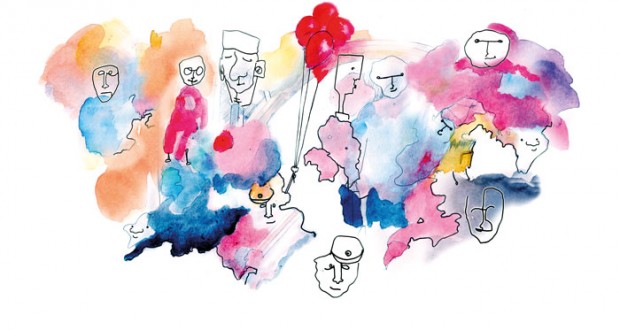The trend of having a higher education continues, and according to most researchers, seems to make us happier. Despite this there is an increase in mental ill-health. Does a few years of studies really makes us happier?
Regardless of whether it is a five year program in Chemical Engineering or a thirty credit course in History of Science and Ideas lying ahead of you, you will certainly ask yourself if the choice to start studying really will make you happier. These last couple of days Lund University has been filled with excited students ready to take their very first university credits. According to Swedish Higher Education, UKÄ, in the autumn of 2014 a total of 6024 new students began their education at Lund University. A number which increased by 200 students since 2013.
After obtaining a few university credits, you learns to think more critical; become more educated and will perhaps find employment with a higher salary after studies. But does it really make us happier? Erik Fernholm works with applying research in well-being and motivation in organisations and schools. He points out there is three general and recurring traits among people who live a Flourishing life. These are self-governance, feeling of solidarity and the feeling of growth.
“Self-governance is being able to be guide yourself and the ability to affect your situation, which is connected with realising your social and economic possibilities. And this is affected by having a higher education. You learn to understand, decipher and manage the world.
When the grind or life becomes tough, we should bear in mind that struggling in moderation does contribute towards our well-being. Because when we struggle and then succeed, we grow, which is an important part of your well-being.
“Studying does provides people with a larger and better toolkit, but I tend to be critical of how people talk about academic merits. On the modern day job market the capability to create a difference, i.e. creating a sense of worth for someone, that is far more important than a degree certificate. Between 2009 and 2010, about 75% of all jobs went through contacts, and that number keeps on growing to this day”, says Erik Fernholm.
It seems that the three general traits: self-governance, solidarity and the feeling of growth indeed benefit from education. However, there is a downside. Even though we educate ourselves like never before, young people in society is a group where mental ill-health have risen during these last years. According to Statistics Sweden, SCB, the number of youths in the ages of 16-24 with sleeping problems, uneasiness or anxiety have increased from around eight percent during the 80’s to being far above 20% today.
Erik Fernholm explains this with that self-actualisation has become more and more important in Sweden. We think very little on how to procure food for the day and survive, and never before felt as much pressure to figure out what to do with our lives.
“My advice to students would be to study some, play around a lot and take those years to figure out what kind person you want to be. But also think about what kind of society you want to live in, what types of relationships you want and the type of enterprise you want to devote your 80 000 hours of work to during your lifetime. Simply put, what kind of citizen you want to be”, says Erik Fernholm.
Self-governance, solidarity and growth. When you think about these factors in relation to study, it feels that the period of studies could be one of the happier moments of our life. You find solidarity among classmates, in societies or nations. You grow through your studies and the new social life that it brings. And you learn to guide yourself and to affect your life situation.
Translation: Viktor Jönsson






